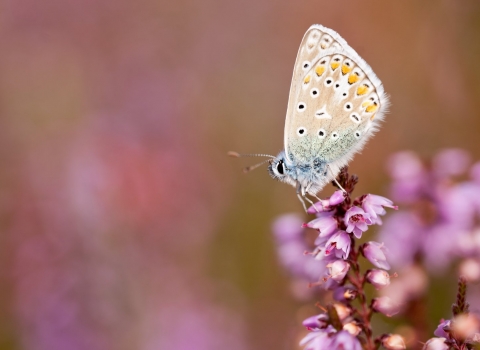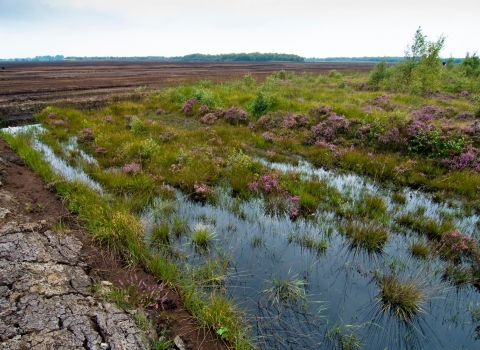Ask your candidates to stand up for nature
This election, candidates will be canvassing across Lancashire, Manchester and North Merseyside - a chance for you to ask them what they'll do to help nature's recovery on your doorstep.
Wildlife is in serious decline, our wild places are under threat by development and pollution, and we're facing a Climate and Environment Emergency. The UK has become one of the most nature-depleted nations in the world, but it doesn't have to be this way.
It is vital that the next government enacts ambitious systems and laws that will guarantee nature’s recovery.
What are we asking candidates?
We're asking all prospective parliamentary candidates in Lancashire, Manchester and North Merseyside three important questions about what they plan to do for wildlife, if elected.
- How will you and your party act decisively to tackle the crises in the natural environment?
- What will you do to ensure we have farming policies that support land managers in contributing to nature’s recovery?
- What will you do to ensure we protect and revive our seas?
We'll publish their responses on this webpage so you can compare and contrast what different candidates/parties have to offer for wildlife and the environment.
Responses from election candidates
William Ward, Green Party Political Candidate for Liverpool, West Derby
1. How will you and your party act decisively to tackle the crises in the natural environment?
Launch a public information campaign to educate the public about the biodiversity loss and other Climate Emergency threats we face, and encourage the behaviour change needed in response.
2. What will you do to ensure we have farming policies that support land managers in contributing to nature’s recovery?
The Green New Deal will transform our relationship with the land. It will increase space for nature through the restoration of natural landscapes, habitats and species in urban, suburban and countryside environments. We want to increase the opportunities for food growing, for greening our landscape and improving our health. Through reforestation, rewilding and regenerative farming, we will reduce carbon emissions and realise the land’s ability to absorb carbon. The way we produce our food needs to support employment, the ecosystem and improve public health. A ten-year transition to agroecological farming will include the transfer of subsidies to farming methods and food systems that create jobs and restore ecosystem health, including the quality of our soils and rivers. It will also advance food sovereignty, including by localising food systems and putting control over the resources to produce, distribute and access food in the hands of communities and workers across the food system. We will also lay down a new natural inheritance to be passed down to future generations, through the creation of community owned and run forests.
3. What will you do to ensure we protect and revive our seas?
Commit to making at least 30% of UK domestic waters into fully protected Marine Protected Areas by 2030. We will also work with British Overseas Territories (BOTs) to increase the ‘blue belt’ protecting BOTs’ waters from commercial extraction, from the current 32% of coverage to 50%.
Anonymous Liberal Democrat Party Political Candidate for Liverpool City Region
1. How will you and your party act decisively to tackle the crises in the natural environment?
Within the Liverpool City Council area I and my Party have been active in preventing the development of green spaces and have moved a series of motions to the Council about tree planting and leaving parts of parks and other open spaces as wild as can be in a City, especially the area close to the River Mersey. This sort of action is writ large within the Lib Dem manifesto.
2. What will you do to ensure we have farming policies that support land managers in contributing to nature’s recovery?
As a City representative this question is beyond my knowledge and I therefore refer you to our manifiesto.
3. What will you do to ensure we protect and revive our seas?
I have done some work with Chris Davies, one of our NW MEPs who chairs the EU's fishing Committee. We must conserve fish stocks by preventing overfishing and must make greater efforts to protect the sea, especially from plastic contaminants.
Chloe Buckley, Green Party Political Candidate for Morecambe and Lunesdale
1. How will you and your party act decisively to tackle the crises in the natural environment?
Wildlife cannot survive without a home, which is why we support a new Nature and Wellbeing Act and will protect the EU Habitats and Birds Directives against any attempts to weaken them. We will ensure that our valuable wild spaces are properly protected and will prioritise action to reverse both habitat loss and the precipitous decline in our wildlife. We will take action to protect pollinators, including developing pollinator-friendly pesticide strategies. We will also continue to push for an end to whaling and keeping cetaceans in captivity. We will guarantee funding for the Wildlife Crime Unit and take coordinated action to tackle wildlife crime both in the UK and across the globe, recognising its link to global crime networks.
2. What will you do to ensure we have farming policies that support land managers in contributing to nature’s recovery?
The Green Party have a number of policies that will support the recovery of agricultural land. We will develop a soil health monitoring programme for England, to match those in Scotland and Wales, to assess and understand changes in the health of soil over time. We also want to increase funding for the Environment Agency and Natural England, to support the vital work they do to protect our environment. We will invest in peatland restoration and end both the burning of peatlands and use of peat in compost in horticulture. We will advocate an emergency international agreement to conserve and enhance carbon sinks and reservoirs including forests, peat fields and coastal and estuarine areas. As a member of the EU we will press for a review of the Common Agricultural Policy, so that it is focused on supporting UK and other EU farmers as they make the transition to sustainable farming.
3. What will you do to ensure we protect and revive our seas?
The Green Party manifesto commits to making at least 30% of UK domestic waters into fully protected marine protected areas by 2030. We will also work with British Overseas Territories (BOTs) to increase the ‘blue belt’ protecting BOTs’ waters from commercial extraction, from the current 32% of coverage to 50%.
Cat Smith, Labour Party Political Candidate for Lancaster and Fleetwood
1. How will you and your party act decisively to tackle the crises in the natural environment?
It is essential that the next Government tackles the current crisis in the natural environment. The Labour manifesto makes clear that Labour’s Plan for Nature will set legally binding targets to drive the restoration of species and habitats. We will embark on an ambitious programme of tree planting, aiming to plant over 2 billion trees by 2040. We would ensure that the Environment Agency are fully funded, create new National Parks and establish a new environmental tribunal to ensure that administrative decisions are consistent with environmental and nature-recovery.
2. What will you do to ensure we have farming policies that support land managers in contributing to nature’s recovery?
In terms of farms, a Labour government will maintain agricultural and rural structural funds but repurpose them to support environmental land management and sustainable methods of food production.
3. What will you do to ensure we protect and revive our seas?
Finally, in relation to our seas Labour will prevent over-fishing by setting maximum sustainable yields for all shared fish stocks and redistribute fish quotas along social and environmental criteria. We will protect our seas from plastic pollution by making producers responsible for the waste they create and for the full cost of recycling or disposal, encouraging more sustainable design and manufacturing.
Ben Wallace, Conservative Party Political Candidate for Wyre and Preston North
Nature-based solutions are key to tackling climate change. I am therefore pleased that the Government is deploying such solutions to improve our natural environment.
First, the 25-Year Environment Plan committed the Government to developing a Nature Recovery Network and, in the long term, to create or restore 500,000 hectares of wildlife-rich habitat outside the protected site series. A new framework for Local Nature Recovery Strategies will be legislated for in the Environment Bill, to help support the Nature Recovery Network and better direct investment in the environment and green infrastructure - creating places that are richer in wildlife and provide wider benefits for local communities.
The Bill will also ensure the environment is at the heart of all policy making and that this Government - and future Governments - are held to account if they fail to uphold their environmental duties. This includes meeting net-zero by 2050.
Our woodlands and wetlands provide vital services, such as carbon sequestration and flood prevention that can help to mitigate climate change and help us adapt to its impacts.
I can assure you that Ministers remain committed to planting 11 million trees and to the shared aspiration of reaching 12 per cent woodland cover in England by 2060. The Government also has ambitious plans to create a new 'Northern Forest' along the M62 corridor, as well as plans to create a new forest project in Northumberland to help improve our natural environment and respond to climate change.
Second, this Government is also committed to taking action to protect and enhance the water environment, including our valuable chalk streams. Chalk streams are under particular pressure at the moment due to low groundwater levels following two dry winters. We are working closely with partners to reform and reduce the volume of abstraction, deliver catchment sensitive farming, reduce pollution and plan future environmental resilience.
The Resources and Waste strategy sets out plans to reduce plastic pollution with a target of eliminating all avoidable waste over the lifetime of the 25-Year Environment Plan. The majority of aquatic litter originates from land-based sources therefore I believe the best approach to stemming the flow of plastic is by taking action on land.
The UK’s world-leading ban on microbeads will help stop potentially billions of tiny pieces of plastic from entering the aquatic environment every year. As well as this, 15.6 billion fewer bags have been handed out to shoppers by the seven main retailers since the introduction of the plastic bag charge in 2015. I am also pleased that following an open consultation, a ban on the supply of plastic straws – excluding those needed for medical purposes - drinks stirrers and cotton buds will come into force in April next year.
Ministers have also consulted on a number of key policy measures, which will significantly change the way we manage our waste. These include: reforming existing packaging waste regulations; exploring the introduction of a deposit return scheme for drinks containers; and increasing consistency in the recycling system; with a parallel consultation on the ‘Plastic Packaging Tax’ which the Chancellor announced in the Budget last year. The Government has now responded to each consultation, and further technical consultations will be carried out in due course.
Finally, under the new Environmental Land Management Scheme the Government will pay land managers public money for public goods, including mitigation of climate change. Land managers could deliver this by sequestering carbon through, for example, peatland restoration and tree planting.
I do hope this will be of some assurance to you. I support a green Brexit in which environmental standards are not only maintained but enhanced.

Ross Hoddinott/2020VISION
Are you a Political Candidate?
Our members would be very interested to know what you'll do for wildlife in Lancashire, Manchester and North Merseyside and across the country. We'd be so grateful if you could answer three questions about how you'll address the biodiversity crisis.

